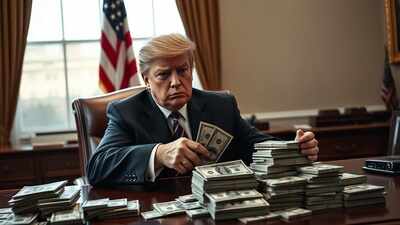Developer Offer
Try ImaginePro API with 50 Free Credits
Build and ship AI-powered visuals with Midjourney, Flux, and more — free credits refresh every month.
Trump Tariff Refunds Loom After Court Ruling
A significant ruling by the US Court of International Trade (CIT) could have major financial implications for policies enacted under former American President Donald Trump. If upheld, this decision might force the administration to refund billions of dollars in import duties already collected.
 If the ruling is upheld it could mean the Trump administration will have to reimburse the substantial import duties already collected. (AI image)
If the ruling is upheld it could mean the Trump administration will have to reimburse the substantial import duties already collected. (AI image)
Landmark Court Ruling Challenges Trump Tariffs
A three judge panel at the CIT concluded on Wednesday that the International Emergency Economic Powers Act (IEEPA) was not a valid basis for Trump to impose widespread tariffs or to bypass Congresss established authority over economic and trade policies.
IEEPA at the Core of the Tariff Dispute
Former President Trump had cited the 1977 IEEPA legislation to justify many of his tariff measures, notably those unveiled in early April referred to as Liberation Day tariffs.
Expert Reaction and Administrations Appeal
Trade experts suggest this ruling could significantly disrupt any future trade agenda. Todd Tucker, a trade specialist at the Roosevelt Institute, commented that this development could do tremendous damage to Trumps agenda. He questioned the rationale for countries to negotiate tariff reductions if the ability to impose them is fundamentally challenged. In response to the CITs decision, the government has filed an appeal with the Court of Appeals of the Federal Circuit, labeling the ruling a judicial coup. Experts also note that alternative methods may still be available for implementing trade policies.
The Multi Billion Dollar Question Tariff Refunds on the Horizon
A key question arising from the CITs decision is whether the Trump administration will be compelled to refund tariffs. If the ruling stands, it could necessitate the reimbursement of substantial import duties. While The Kobeissi Letter estimated collected tariff revenue at $10 billion since April 2, analysis of Treasury Department records by Newsweek suggests the figure could be even larger.
Who Qualifies for Refunds Importers Likely Consumers Not
William Reinsch, former under secretary of commerce for export administration, believes the courts order should prompt US Customs and Border Protection (CBP) to suspend the liquidation of entries. This would mean that if the decision is ultimately upheld importers could receive their money back. Those eligible for refunds would likely include American companies and overseas exporters contractually obligated to pay these duties. However, Reinsch clarified that consumers who faced higher prices for imported goods are probably not likely to receive direct refunds from this ruling. The importers who paid the tariffs might get their money back, he stated, but they are not obligated to pass these savings on to consumers, though some might do so voluntarily. He also expressed skepticism about the success of potential consumer lawsuits seeking compensation from the government. For more context on related financial discussions, some have raised concerns about potential multitrillion dollar tax breaks and government debt under Trump, a topic that has even drawn comment from Elon Musk.
Legal Options and Past Precedents for Tariff Reimbursements
Legal experts suggest that importers might have grounds to sue the administration for tariffs paid on goods that have already cleared customs. It is worth noting that the Trump administration has previously acknowledged its duty to reimburse certain tariff payments when those duties were later removed or lessened. For instance, after a late April decision found that some tariffs should not be applied cumulatively or stacked, an executive order was issued applying this retroactively to specific tariffs. This order also affirmed that reimbursements for overpaid duties would follow existing laws and standard CBP refund processes. Similar procedures were outlined when exemptions to Trumps reciprocal tariffs were announced, and the CBP has provided instructions for importers on claiming refunds for tariffs that were subsequently withdrawn or reduced.
Economic Fallout Trumps Tariffs Cost Companies Billions
Beyond potential refunds, Trumps trade policies have already inflicted a significant economic toll. Corporate disclosures analyzed by Reuters indicate that companies have suffered over $34 billion in losses due to decreased sales and increased expenses. This financial strain is anticipated to worsen as businesses grapple with ongoing tariff uncertainty, which influences operational choices at major global companies. Leading firms across three continents, including Apple, Ford, Porsche, and Sony, have reported substantial setbacks, with many retracting or significantly lowering their profit forecasts. A common sentiment among these companies is that the unpredictable nature of Trumps trade measures has made it impossible to accurately calculate the costs. These trade tensions also reflect broader issues, such as Trumps criticisms of China for allegedly violating trade agreements.
Broader Economic Worries Ripple Effects of Trade Policy
The reported $34 billion in losses represents figures from a selection of S&P 500, STOXX 600, and Nikkei 225 companies. Financial experts believe the true business impact is likely much higher than these reported numbers. Jeffrey Sonnenfeld, a professor at the Yale School of Management, suggested that the actual magnitude could be double or triple the tallied figures and still be an underestimate. Sonnenfeld also warned of more severe, broader implications, including potential decreases in consumer and business spending and increased inflation projections. This highlights the complex challenge of implementing tariff policies, with some reports indicating that the Trump administration was preparing alternative strategies to impose tariffs even if faced with legal setbacks.
Compare Plans & Pricing
Find the plan that matches your workload and unlock full access to ImaginePro.
| Plan | Price | Highlights |
|---|---|---|
| Standard | $8 / month |
|
| Premium | $20 / month |
|
Need custom terms? Talk to us to tailor credits, rate limits, or deployment options.
View All Pricing Details

